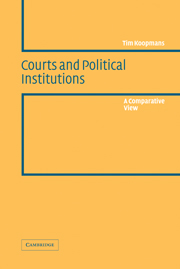Book contents
- Frontmatter
- Contents
- Preface
- Table of cases
- List of abbreviations
- 1 Introduction
- 2 The Sovereignty of Parliament
- 3 Judicial review of legislation
- 4 The growth of judicial power
- 5 The limits of judicial review
- 6 The legality of administrative action
- 7 Courts and governments
- 8 Courts and individual rights
- 9 Techniques of judicial protection
- 10 A glance at the future
- Select bibliography
- Index
8 - Courts and individual rights
Published online by Cambridge University Press: 26 February 2010
- Frontmatter
- Contents
- Preface
- Table of cases
- List of abbreviations
- 1 Introduction
- 2 The Sovereignty of Parliament
- 3 Judicial review of legislation
- 4 The growth of judicial power
- 5 The limits of judicial review
- 6 The legality of administrative action
- 7 Courts and governments
- 8 Courts and individual rights
- 9 Techniques of judicial protection
- 10 A glance at the future
- Select bibliography
- Index
Summary
Freedom of expression
The American Bill of Rights starts, in the First Amendment, with the protection of ‘the freedom of speech, and of the press’, as well as the freedom of religion and of peaceful assembly. Freedom of expression is indeed traditionally considered as an element of democratic decision-making, and also as one of the most important bulwarks against undemocratic tendencies in government.
One of the charms of American case law is that the US Supreme Court often identifies the rationale of constitutional provisions before trying to define their meaning. Decisions on the First Amendment are frequently based on a philosophy of freedom, which is explicitly expounded in some of the Court's judgments. A famous example can be found in the concurring opinion of Justice Brandeis in a 1927 case concerning the constitutionality of a state statute banning communist trade unions. The opinion sets out to explain ‘why a state is, ordinarily, denied the power to prohibit dissemination of social, economic and political doctrine which a vast majority of its citizens believe to be false and fraught with evil consequence’. The men who won American independence, Justice Brandeis states, believed ‘that freedom to think as you will and to speak as you think are means indispensable to the discovery and spread of political truth; that without free speech and assembly discussion would be futile; that with them, discussion affords adequate protection against the dissemination of noxious doctrine’.
- Type
- Chapter
- Information
- Courts and Political InstitutionsA Comparative View, pp. 192 - 222Publisher: Cambridge University PressPrint publication year: 2003
- 1
- Cited by



